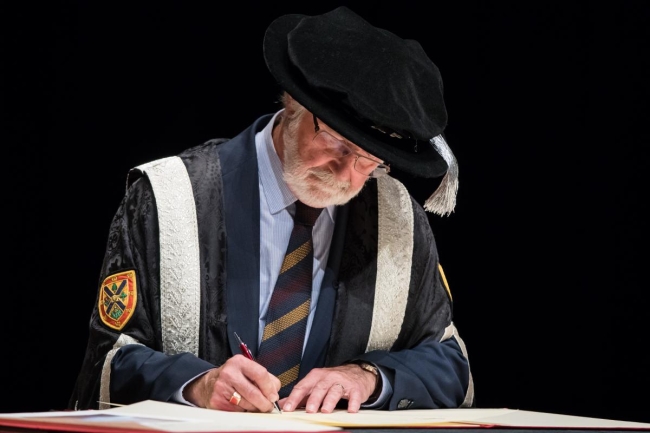You have /5 articles left.
Sign up for a free account or log in.

Patrick Deane, principal of Queen’s University in Canada and president of the Magna Charta Observatory governing council, in 2019.
Courtesy of the Magna Charta Observatory
European university leaders gathered in Bologna, Italy, nearly 33 years ago to sign the Magna Charta Universitatum, a document asserting fundamental values of autonomy and academic freedom. In the ensuing decades, the number of universities signing the document grew from the original 388 to around 900, from almost 90 countries around the globe.
The touchstone document was due for a refresh. University leaders gathered virtually last week to celebrate the launch and signing of a new Magna Charta, which expands on the principles outlined in the original document in light of the globalization of higher education that occurred in the decades since the first Magna Charta was signed on Sept. 18, 1988.
“The world has since become interconnected in ways unimaginable at the time of the original declaration,” the new document states. “Universities have proliferated around the globe, dramatically increasing in variety as well as scope and mission. Globally the number and diversity of students seeking a university education has increased, as have their reasons for doing so and the expectations of their families and communities.”
The document describes an erosion of trust in expertise and changing modes of learning, teaching and research. “Despite these changes,” the document says, “the potential of higher education to be a positive agent of change and social transformation endures. The principles laid out in the Magna Charta Universitatum are as valid today as they were in 1988, and they are the necessary precondition for human advancement through enquiry, analysis and sound action.”
David Lock, the secretary general of the Magna Charta Observatory, an association of signatory universities, said the new document does not depart from the core principles of the original.
“Note the principles are the same,” he said. “They’re all there: the importance of autonomy, the importance of academic freedom, the importance of universities serving society.
“What this adds is more details about the sort of challenges that universities face, the contexts in which they work and what the expectations of society might be. For instance, sustainability is now a much bigger theme facing universities … than it was in 1988. And equity and access to higher education, this has become a much bigger issue for universities now than it was in 1988.”
“There’s also a sense in which the new document is more bold than the old one, for instance, the unequivocal statement education is a human right,” Lock continued. “This academic argument goes on today. Is it a human right, is it a public good, is it a private good? This document comes out and says very boldly, ‘Education is a human right, a public good and should be available to all.’”
An international group drafted the document, which was developed with widespread consultation: Lock said more than 200 institutions responded to questionnaires sent out as part of the drafting process.
The eight-member drafting group included a student representative, Tamires Gomes Sampaio, of Brazil. Sampaio said during a virtual event celebrating the official launch of the document last week that the new document "is a kind of recognition that we are part of the university, not only as passive subjects but as active actors who are part of the construction and implementation of these principles that MCU defends."
Sijbolt Noorda, president emeritus of the University of Amsterdam and chair of the drafting committee, noted that the context for the new document is very different than the context for the original one, when there was a feeling “that the old world order was in its last hours, in its last weeks, and that we were moving to a future that promised to be brighter.”
“If we are to characterize today’s mood, it is in a way somewhat the opposite,” Noorda said during the virtual event. “If we look at the map of university autonomy or the map of university academic freedoms over the years, we see more difficulties and more deep challenges every other year. The situation seems to go downhill rather than uphill.”
Noorda described a need to "reiterate those basic convictions and autonomy and freedom" and to "state these afresh, with an eye on the present circumstances and with an eye on a global setting."
“We should also realize that the world has over 20,000 universities and many of them are driven by commercial interests, many of them are driven by very narrow interests of their owners; others are very much driven by the direct interests of the ideological or political powers that steer them,” he said. “So in a way in pleading for autonomy and freedom in making these statements that we do in this new Magna Charta, we’re also building a front, we are also fighting for these ideals, to be adhered to and to be living values in universities.”
Robert Quinn, executive director of Scholars at Risk, a group that monitors academic freedom globally and assists scholars facing threats or persecution, and a former member of the Magna Charta Observatory’s governing council, said that despite the many challenges, there are people all over the world who believe in the values of academic freedom, university autonomy and the need for universities to serve society.
“Where the Magna Charta has been most useful is presenting an opportunity for institutional leaders to step forward and say we are part of that community, we self-identify with these values and we want people to know we self-identify with these values,” he said. “The Magna Charta becomes a magnet for them to step forward.”








